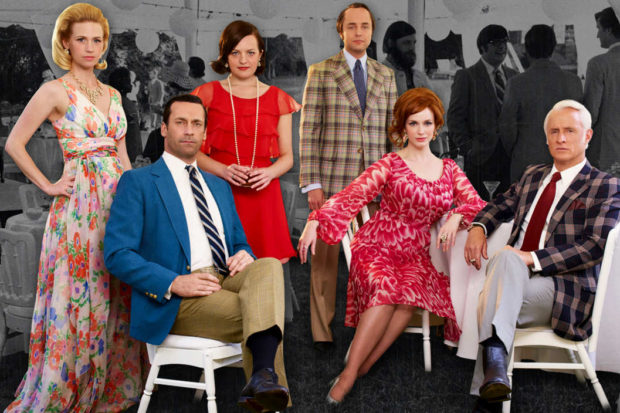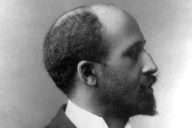By Jeremy Varon
The finales of beloved television series have long been hyped as heralding “the end of an era.” Such claims are hardly just the conceit of marketers eager to turn the last episodes into mega-audience, cultural events. Far beyond fodder for cohort nostalgia, television programs can be significant markers of historical time, by which we may date our own becoming. I came of age with All in the Family and M*A*S*H, squarely placing me in a 1970s America still struggling with the conflicts of the 1960s. Other generations claim different lineages.
Mad Men’s passing after an eight-year run amply earned its billing as an epic end. Mad Men was an exquisite show, credited with capturing the cynicism of Great Recession-era America, even though set in famously idealistic times. It now takes its place in the pantheon of “quality TV,” alongside the Sopranos and The Wire (sorry, Breaking Bad).
Mad Men also exited amidst immense changes in the entertainment industry. Increasingly, streaming services like Netflix are producing and releasing up front the entire run of serial dramas so as to permit binge watching. Cable and network TV are fast following suit. Appreciating the longue durée of a show like Mad Men in increments — each available for intense cultural processing in set units of time — may soon be a thing of the past. Private, on-demand consumption further displaces shared experience. Changes in the medium are bound to affect how messages are crafted. The kind of narrative intricacy and thick character development that made Mad Men so successful — and so evocative of the 19th-century novel, to the delight of bookish fans — may likewise wither.
Finally, Mad Men, whose storyline begins in 1960 and ends in 1970, perfectly bookended a decade. In its trajectory, the Sixties literally came to an end. This may well be the most intriguing aspect of its conclusion, especially for an historian of postwar America like myself. The show is among the most important representations ever produced within popular culture of the Sixties, if not of any period in US history. (Roots, as a chronicle of the age of slavery, comes to mind as a rival.) Mad Men’s summation is occasion not only to take stock of how the Sixties fared, but also to ask if the show broke new, potentially lasting ground in how the American past is represented, on television or elsewhere. The final, enigmatic episode poses the obvious question, “Wither Don, Peggy, et. al.?” The greater fun, however, is also to ask “Wither America?” within the thematic logic of the show as it sits, lotus-style, on the promontory of a new decade.
* * *
Mad Men’s depiction of the 1960s was, as critics amply noted, so counter-intuitive as to be irreverent. The show’s leading characters started out as pro-Republican men of the 1950s, suspicious of the upstart Kennedy. In the blue-blood world of Sterling-Cooper, sexism approached misogyny and racism was a given. The detailing of this rot gave rise to the pundit quip that the show was a case for why the 60s, defined by their social movements, “had to happen.”
At the same time, Mad Men located in the World War Two and Korean War generations a licentiousness that made the indulgences of the 1960s counterculture look tame. For the Mad Men, the Father Knows Best morality was always something of a joke — a patina of pallid, mainstream rectitude that served mostly to enable its rank transgression. The Sixties, in sum, are turned by Mad Men on their head: populated by socio-political laggards who both anticipate and exceed the imminent trashing of prudish norms, while remaining deaf to the social struggles that gave the Sixties their gravitas.
Mad Men also assiduously avoided direct engagement with the storied dramas of the era, whether civil rights activism or the Vietnam War. Herein lay its greatest innovation as a period drama: to glide past the obvious markers of its period. Vietnam is addressed only obliquely through the entanglements of tertiary characters with the military draft. The show’s versions of Sixties archetypes — whether the witless Beatniks Don meets via his mistress Meg, or the creepy communards to whom Roger’s daughter flees — are objects of ridicule, if not scorn. The hipsters at Sally’s boarding school, one of whom draws on literary giants to craft his own pretentious nickname, remain lusty boys out for high school virgins. People are no nobler, the show instructs, for taking on the trappings of enlightenment. So much of the Sixties, Mad Men suggests, was just this masquerade.
The boomers fare terribly in this jaundiced view, which dominates the gaze of Mad Men’s creator Matt Weiner. At points in the show, one almost feels his glee at the artful dressing down of idols. If Mad Men carried any burden, it was to indict — as Weiner all but admitted — the fraudulent sanctimony of the boomers. Their “greatest generation” self-regard squares poorly with the mess so many made of their own lives and those of their children, as the show savagely depicts.
Playing against historical type, Mad Men achieves its central tension: to show characters stubbornly resistant to change in an era defined by change. In the first seasons especially, Don repeats cycles of affairs, binges, and meltdowns. Betty’s divorce of him is less a declaration of independence than a retreat to a more reliable cloister. Roger remains an affable chauvinist, rising above most every debacle of his mercurial indiscretions. Little in the turbulent, surrounding culture affects their outlook or behavior.
The dissonance between the show’s characters and their epoch is so extreme that one may doubt that Mad Men cares nearly as much about history as its studied attention to period detail suggests. The show, I argued in a 2013 essay addressing the first four seasons, was ultimately another riff on a seemingly chronic condition of white, middle-class discontent, which changes little based on the decade in which it is set. Though beholding a shape-shifting decade, we mostly see in early Mad Men a near static portrait of American misery.
* * *
Is it fair, then, to say that history is for Mad Men mostly a backdrop, such that it is a show in the Sixties, without quite being a show about the Sixties? I would now resist such a view, particularly in light of its last three seasons. In them, the vapors of a fermenting social order at last leak through the bubble surrounding the main characters. A case can be made, moreover, that Mad Men — precisely by defying assumptions about how the Sixties should be represented — hews to a truer realism than familiar tales of the era’s intergenerational strife and political turmoil.
For starters, the 1960s, by a credible timeline, did not begin in earnest until 1965 or so. By that point, Kennedy was long dead, along with whatever “innocence” he represented. The Civil Rights Movement gained national resonance. American involvement in Vietnam dramatically escalated, as did opposition to the war. And the counterculture fully launched, propelling America’s passage from black and white into Technicolor. Prior to that, much of 1960s America looked and felt like 1950s America. True to this periodization, Mad Men begins by its midpoint to register more and more the conflicts and change energy for which the Sixties are best known.
By the same token, scholars have stressed, the iconic rebellions of the 1960s were already well underway in the 1950s, evident in the long history of civil rights struggle and its “organizing tradition.” Germane here, social critics warned of the coercive conformity of thought and taste that defined postwar, mass society. Advertisers pushed back against an ossified corporate culture and infantilizing cult of the expert that didactically set consumer choice. The very kind of ad men Mad Men profiles started waging in the late 1950s their own rebellion, more as an extension than a rip-off of the insurgent youth culture.
Mad Men captures this dual movement both backward and forward. In one gesture, it describes an insular industry for which the egalitarian values of the 1960s had barely arrived, even well into the decade. In another, it portrays urbane mavericks at various cutting edges. Such pockets in the culture, at once retrograde and forward looking, really existed.
Equally important, the show offers a refreshing lesson in the demographics and raw math of social change. The number of true pioneers who made the rebel Sixties — the activist die-hards, the breakthrough bands and rock impresarios, the arts innovators, the doggedly free spirits — was actually quite small. This tally holds even as rebellion, however diluted, became a mass phenomenon. (Think of the Beatles’ initially controversial fandom, rooted in the artistry of four extraordinary musicians, their avant-garde arranger, and visionary handlers.) Mad Men, in short, shows us the sidelines of the turbulent Sixties, where most people lived. It hardly pays tribute, however, to Nixon’s vaunted “silent majority” of passive supporters of a traditional America. Rather, it chronicles the complex, even messy ways that a specific cast of characters adopted, adapted to, and sometimes rejected the new thinking of their times.
Mad Men was at its best when recording the tectonic shifts in American culture — changes both so fundamental and subtle as to often escape immediate notice, but which irrevocably altered the political, social, and existential terrain. Such shifts are most profound in the lives of the female characters. Led by Peggy, and later joined by Joan, they shatter so many glass ceilings, while expanding the field of choices for women. Yet they align with the core feminist demand of workplace equality without any epiphany about patriarchy, cathartic moment of defiance, or explicit involvement in the women’s movement.
For Joan overt pushback comes only at the series’ end, when she stands up to the putrid sexism of McCann and ditches her playboy paramour to start a women-owned business. But even these acts seem more an expression of her instinctive sense of just deserts and a personal vision for her life than the assertion of a formal principle of equality. For Peggy, feminism seamlessly comingles with her professional ambition. In these portraits, Mad Men testifies to feminism’s extraordinary reach by showing how its values transcend any particular ideology, organization, agenda, or milieu. If with lesser rigor, Mad Men also shows the ambient appeal of the drug culture, gender-bending style, and bohemian affect, all of which hit the mainstream.
Read by its angle of vision, Mad Men offered not so much an iconoclastic take on the 1960s as a distinct, nuanced vision of how people experience history and inhabit their own present. It is not too much to credit the show with its own understanding of historical change, if not a philosophy of history. A propos, Mad Men seemed at times an upscale, melodramatic version of the German genre of Alltagsgeschicte — the granular depiction of history through the often slow, evolutionary changes in the everyday lives of ordinary people. By another comparison, the show seems cousin to Downtown Abbey. The wildly popular British drama shows the changes wrought by democratic modernity to the lives of fading aristocrats, clinging to privilege in the name of the inherited order of things. Finally, the fashion so prominent in Mad Men provides an apt metaphor for how it represents change. Season to season (in both fashion and TV time), the hemlines rise or fall, dresses grow smarter, sideburns extend or shorten, ties thin and thicken, and pop art enters office décor. Absent conscious commitment to new looks, the characters change wardrobes — much as we adopt new attitudes in step with changing, ideological fashion. In this way, the show’s more superficial focus on the period’s style helps orient the presentation of its substance.
* * *
Mad Men’s portrait of the Sixties may be original, clever, and instructive. But is it politically edifying and morally adequate? I hate to hold the show, as any art, to potentially censorious standard. But the very values of the Sixties, and ethical imperatives that never vanish by being downplayed, force this judgment.
From the show’s start to its end, race was the Achilles heel of Mad Men. Save for fleeting sub-plots, race was excluded from the show, along with African-American characters. The show’s defenders can argue that the Mad Men crowd may not have known any blacks, save as domestic servants and office help, or cared a wit about racial justice. To suggest otherwise would be tokenism, if not a forced effort to be “politically correct.”
I reject this alibi. It is impossible to imagine that Mr. Weiner and his talented writers could not conjure up engaging storylines about black America. The show routinely solicited academic experts to nail certain plot lines (a colleague of mine expert in the draft, made to sign non-disclosure agreements about his involvement, was such a wise head). A fleet of specialists, eager to see race given greater due could easily have been tapped.
The absence of storylines about race feels like both a missed opportunity and a concession to white comfort with the whitewashing of American history. I would not be surprised if African Americans commonly regard Mad Men as another white show presenting high class, white people’s problems as somehow emblematic of a universal condition. Showered with Emmys and critical praise, it excluded a priori precisely that population responsible for giving the Sixties their grandest meaning within American history. If TV’s hall of fame permits an asterisk, Mad Men should suffer this blemish. And if some wish to damn the whole show on its account, so be it.
More generally, Mad Men subdued to a fault the political struggles from which its characters benefit. The show gives us feminism without the women’s movement; skepticism about the Vietnam War without an anti-war movement; and the casual embrace of drugs without any awareness of those who suffered for the intoxicating cause. The truest measure of a movement’s success may be the easy adoption of its values in unsuspecting adherents. But this dynamic is the result of blood, sweat, and tears at various frontlines, not social alchemy. Further, even on the sidelines, people have political conversations — something we almost never saw on the show.
Matt Weiner is clearly a genius observer of the human condition and at least aspects of history. But one senses that he has negligible familiarity with activism and the effort it entails to change mores, behaviors, and institutions. History’s arc, as Martin Luther King, Jr. intoned and President Obama is fond of repeating, may bend toward justice. Mad Men, in its broad sweep, affirms this teleology. But the arc is bent by real people. Mad Men so demythologizes the Sixties that it withholds the lesson of this very human process that it might otherwise have delivered, even if with its characteristic subtlety.
Here again, fashion may serve as metaphor. Watching the show, I was periodically reminded of the devastating scene in The Devil Wear Prada that breaks down how clothing trends work. In the scene, the Anna Wintour character explains to her ingénue assistant that the miserable blue sweater she pulled from the bargain bin was hardly there by accident. Rather, a visionary designer put out “cerulean blue” on the runways. By countless mediations, cerulean haute couture devolved into affordable offerings for the everywoman, typically worn without a wit of awareness of their exalted origins.
It may be revelatory to focus on the quotidian tastes of the end-user, whether in fashion or politics. But this emphasis captures only part of the story. Its political version — the means by which innovators and early adopters foment large-scale change — is something our times, riven by concern with income inequality, police violence, student debt, and threats to civil liberty, are eager to learn more about. Being politically smart need not mean being politically correct in the pejorative sense of didactic and self-righteous simplification
Predicting the future of memory is always perilous. By one happy outcome, Mad Men gives rise to more period dramas that intimately explore diverse experiences of history, while giving greater due to its movers and shakers. By contrast, the danger is that imitators make a fetish of anachronism and turn whole eras into caricatures by privileging the contrarian take. NBC’s Aquarius, oozing with a post-Mad Men sensibility, is a worrisome sign. Starring David Duchovny, it profiles a Los Angeles detective in 1967’s Summer of Love. The character seems an amalgam of Agent Mulder, Dirty Harry, Jack Bauer, and a 50s-style gumshoe, prone to the criminal assault of Hippie poseurs. His mission is to rid America of the countercultural riff-raff, epitomized by the young sociopath Charles Manson. The Sixties surely had their creepy side, for which Manson is the arch-exemplar. But to read the entire counterculture through his murderous nihilism and a throwback defender of God-knows-what badly skews the balance of the era. My hope is that our culture does better, schooling itself on Mad Men’s unique brilliance while steering clear of its flaws.
* * *
A great part Mad Men’s success is to intertwine the collective story of societal change with the personal saga of its alluring lead, Don Draper. A dapper man of the 1950s who drinks Old-Fashioneds, Don patently wasn’t made for his changing times. By the same token, he participates in two of the hallmarks of the Sixties: the impulse to self-reinvention and the quest for authenticity. As Don’s life plays out, Mad Men imparts perhaps its central lessons.
The 1960s were all about transcending origins. For the comfortable set, the challenge was to ditch middle class morality and futures either in plastics or as the housewives of defeated, corporate men. The political rebels of the Students for a Democratic Society (SDS) inveighed against a college ethic of “Work, Study, Get Ahead, Kill,” as students were groomed for careers as functionaries in a death-dealing, imperialist system (such was the SDS line). Blacks, Latinos and other minorities, along with women and gays, fought for the very right of personal self-determination against entrenched structures of belittling prejudice.
Awakened to futures beyond one’s social script, young people remade themselves as Beatniks, folkies, Hippies, student and community organizers, militants, revolutionaries, proud Blacks, defiant First Peoples, women’s libbers, gay liberationists, back-to-the-landers, yogis, mystics, rock stars, artistes, and seekers. Behind this self-fashioning lay the challenge to discover and commune with one’s “authentic” self — the better, truer person buried under an alienated shell. San Francisco’s Diggers formally captured this paradoxical passion to concoct one’s authentic self with their notion of the Life Actor. The trick to liberation, the concept instructed, was to act out a virtuous, liberated persona that felt true to who you really were. By becoming a star in your own movie, and gifting others with the example of your moxie, you pushed society to allow other free spirits to follow their own, self-created scripts.
Don Draper embodies a fascinating variation of this generational project. He surely seeks to escape his tainted origins as the bastard son of a prostitute, raised in a brothel. This rearing overexposed him to the seedier side of humanity. It also schooled him in an honestly about the cunning power of libido, whose indulgence inspires in him little sense of scandal. He never had to break from prudish 1950s morality because he never was under its spell. Don possesses sexual appetite in spades, long before the era of free love and transcending the leering ways of his troglodyte colleagues, like Roger.
Don’s escape from his origins, in a literal act of self-reinvention, entails his stealing the name of his mortally wounded, Korean War military superior. Thereafter, his Don’s is an elaborate sequence of ruses by which he pretends to be someone he is not, while plausibly becoming his invented character. Don is like a pure commodity, lacking any prohibitively defining attributes and able to be whatever he sells himself as. Far from coincidental, his wizardry as an ad man is to concoct the story best suited to the needs of a given product, company, or moment. In Mad Men’s inaugural episode, Don convinces worried tobacco executives that everybody else’s tobacco cause cancer. Theirs, by delicious contrast, is “toasted.”
In a sense, Don’s greatest advertisement is for himself. This raises the possibility that the show’s master point — notwithstanding the Sixties’ bid for personal authenticity — is that the self is always already image-craft, a more or less skilled fabrication.
The central hazard of Don’s life is not so much that he will be ruined by his childhood trauma and raging id, or discovered as a fraud by wives and bosses. Rather, it is that he will remain disconcertingly hollow beneath the confabulation that is his self. The point of the fabricated person, by one measure, is to make the artifice of the contrived self seem real.
Mad Men’s final season painfully chronicles the unmaking of Don as an invented person. His tried and true pattern of straying no longer delivers even distracting pleasure. The anguished, nymphomaniac divorcee he beds proves unavailable for either escapism or rescue. Unable to save her, Don cannot redeem that part of himself that is most like her: desperate for genuine attachment (to children, for instance) but doomed to dissolute wandering.
All the while, Don divests himself of most everything about which he seemed to care. He gives Megan the bulk of his accumulated fortune — one million dollars! — as recompense for his infidelity. He remains blasé at the theft of his furniture, while letting his artful penthouse go with clumsy nostalgia. He walks out of the corporate boardroom during a brainstorming session, perhaps for the last time.
Urban swank yields to Midwestern noir, as our hero wanders through America and quizzical reflection on his life. The cancerous Betty rejects his offer of help, while his wayward, pseudo-daughter in California refuses his awkward gift of Meg’s wedding ring as a keepsake-heirloom. With no true family, or home, or workplace, Don descends into nothingness. His last generosity is to wish strangers, including a vile, small-town hustler, a better go of wander-lust and a life of lies. To Peggy’s pleas that he come home, Don answers that he has no place to go.
Don’s anguished confessional to Peggy is telling. Though newly sexy in a stylish work shirt, he laments: “I messed everything up. I’m not the man you think I am. . . . I broke all my vows. I scandalized my daughter. Took another man’s name, and made nothing of it.” In this we hear the most forceful stirring in the entire series of Don’s disgust with his own life. But we also hear his absurd complaint that he could have done better with the scams he engineered. One wonders if he is more upset with the fate of his mortal soul or his poor play of ill-gotten gains and terribly bad behavior. Genuine integrity, humility, or soul-searching seem to escape Don.
All this makes for a fascinating denouement to a great epic of the self, while setting up the show’s enigmatic ending. I was delighted to see Don’s breakdown in a therapeutic commune in California’s Big Sur. For most of Mad Men’s run, Don was either too abject as the son of a whore, or too exalted as an impossibly successful and handsome advertising titan, to inspire easy identification, give our own, mostly lesser lives. But in the final episode Don communes with a beleaguered everyman, tormented by a lack of appreciation, affection, and love. Don’s quest for happiness, consecrated with his embrace of a wounded, unexceptional comrade, becomes our own. The entire show yokes from an encounter with macro-social, historical forces to the chronicle of singular — yet resonant — bid for meaning in an individual life.
Don, amidst his swoon, confessed to Peggy, “I’m not the man you think I am.” But who is? The masculine myth if the mastery of the self is here revealed as a ruse. Even a man blessed with uncanny looks, winning charm, and an intelligence and wealth unavailable to most of us, feels himself inadequate. If Mad Men depicts the challenge of women to shape the meaning of their lives, it also shows the burden of men, no matter their privilege, to live meaningful lives.
On the shores of America’s golden coast, Don experiences — by my optimistic reading — the serenity of a freedom he at last finds. His emancipation is from the curse of his origins, the impulsive re-routing of his trauma, his need for lies, and the attachments of money, professional success, and the roles of husband, father, mentor, and resident genius. His Cheshire smile on a sparkling bluff signals hope, for him and for us all, regardless of gender or station in life
Yet into this paradise of self-discovery crashes the treacly tones of the iconic Coca-Cola commercial of 1970, scrambling any certain sense of the meaning of Mad Men’s ending holds. Critics fumed that the show took the easy, cliché-ridden out, presenting 1970s, Me-decade narcissism as the fraught answer to the confusions of the Sixties. John Hamm, who played Don Draper, opined that Don’s epiphany was that he was an ad man at heart. This take suggests his imminent return to New York, fortified by a little reflection and sunshine. A great block of critics, in a scenario I had not even considered while watching the show, contend that Don — poised to work on McCann’s Coca-Cola account — conjures in his meditative repose the commercial we then see. His near suicidal journey turns out to be field research yielding a famous, commercial.
I read the commercial as exogenous to the narrative, delivering the kind of meta-commentary that each show’s concluding soundtrack typically provides. But what is the meaning of the song, for the last episode and the show as a whole?
Ambiguity may have been part of Matt Weiner’s intention. The greatness of Mad Men is enhanced by interpretive mystery, no matter how unsatisfying by the demands for narrative closure. Even so, I have my ideas.
One possible message of the Coke commercial is that life is all image craft — all branding and persiflage, whether the product, political moment, or trials of an individual life. What does Don, as all of us, seek and need? A better commercial, a truer brand, a superior jingle to guide our lives?
To ask as much is not to damn advertising as so much fakery. Rather, it is to see the great whole of America as the fabrication of signs — as the performance of self and world, ultimately liberated even from the fiction of personal truth. Here Mad Men takes on its potentially chilling message. In the imperious world of the market, the shrewd pursuit of profit with the imaging of common dreams of multi-culti happiness, stull rules. We all participate in this historic-cosmic joke, no matter our desire to escape it. By extension, the Utopianism of Coke’s hope “to teach the world to sing” — no matter the existence of foreign wars designed to keep the world safe for American products and mythologies — is no less or more sincere than any collective or personal dream.
Here Mad Men testifies to the inescapability of advertising a commercially-driven factory for the production of aspirations to happiness, fun, love, and loyalty to family, home, and memory. Don once shilled for all this, only to behold its hollow logic, in his own life at least. His beatified smile plausibly testifies to the enduring appeal of advertising as the main repository of our hopes and dreams.
The militants of the Sixties tried both to reveal and smash this logic. Its endurance testifies to the enduring dominance of a neo-liberal order, which Mad Men helps explain. The world may well sing the same tune only in the stagecraft of audacious advertisers, intent to boost their client brands. Any alternative harmony depends on the very activism Mad Men mostly ignores. Advertising — perhaps the true protagonist of the entire show — may forever succeed by routing everyday dreams to its chosen products. It will defeat itself, and the corporate order of which it is a part, only if we rest power and bliss from its clutches.
Mad Men has said plenty about the odds of the great, countercultural dream of the Sixties and its periodic revival. The values of this gamble, if we are even willing to take it on, remains up to us.
***
Jeremy Varon is an associate professor of history at The New School for Social Research and Eugene Lang College, specializing in modern US history, European and American intellectual history, and German history. In 2004 he published Bringing the War Home: The Weather Underground, the Red Army Faction, and Revolutionary Violence in the Sixties and Seventies (University of California Press). He co-edits The Sixties: A Journal of History, Politics and Culture (Routledge), an academic journal that features interdisciplinary and international research on the “long Sixties” (1954-1975).







No Comments